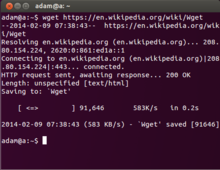Portal:Free and open-source software
| Main page | Categories | Contribute |
Free and open-source software (FOSS) is software that is distributed in a manner that allows its users to run the software for any purpose, to redistribute copies of it, and to examine, study, and modify, the source code. FOSS is also a loosely associated movement of multiple organizations, foundations, communities and individuals who share basic philosophical perspectives and collaborate practically, but might diverge in detail questions.
The historical precursor to this was the hobbyist and academic public domain software ecosystem of the 1960s to 1980s. The FOSS movement's "free" part originates from Richard Matthew Stallman, who noted the lost freedom to users on the decline of the public domain ecosystem and the growth of a copyrighted proprietary software ecosystem.
In response, as a hack of the copyright system, he created the GPL, a protective copyleft license, aiming for the creation of a complete and free operating system — GNU. Shortly after, the BSDs (FreeBSD, OpenBSD, NetBSD) brought an alternative FOSS approach to the table: the more public domain–like permissive licenses. Other noteworthy FOSS organizations from this time include the Apache Foundation (Apache Server), GNOME, Debian, Mozilla Foundation (Firefox), with their own ideas: The Free Software Definition, Debian Free Software Guidelines, The Open Source Definition, and more.
At the end of the 1990s, in the context of the dot-com bubble and web 2.0, the Open-Source movement (with Eric S. Raymond, Bruce Perens, Tim O'Reilly and others) gave important impulses to FOSS with the achieved open sourcing of Netscape's browser as Firefox and Sun Microsystems' office suite, OpenOffice.org.
The incorporation of Linus Torvalds' Linux kernel in FOSS OS paved the way to broad mainstream recognition and acceptance of FOSS in the IT domain and among the general public. In the 2010s GitHub's openness and collaboration encouraging software repository cloud service brought FOSS software development & maintenance methodologies to mainstream software development.GNU Wget (or just Wget, formerly Geturl, also written as its package name, wget) is a computer program that retrieves content from web servers. It is part of the GNU Project. Its name derives from "World Wide Web" and "get". It supports downloading via HTTP, HTTPS, and FTP.
Its features include recursive download, conversion of links for offline viewing of local HTML, and support for proxies. It appeared in 1996, coinciding with the boom of popularity of the Web, causing its wide use among Unix users and distribution with most major Linux distributions. Wget is written in C, and can be easily installed on any Unix-like system. Wget has been ported to Microsoft Windows, macOS, OpenVMS, HP-UX, AmigaOS, MorphOS, and Solaris. Since version 1.14, Wget has been able to save its output in the web archiving standard WARC format. (Full article...)
Although there was free software before, in 1983 Richard Stallman launched the free software movement and founded the Free Software Foundation to promote the movement and to publish its own definition of free software. Others have published alternative definitions of free software, including the Debian Free Software Guidelines and the Berkeley Software Distribution-based operating system communities.
In 1998, Bruce Perens and Eric S. Raymond began a campaign to market open-source software and founded the Open Source Initiative, which espoused different goals and a different philosophy from Stallman's.
The following operating systems are released under free software licenses:

Mobile operating systems:
Desktop and server operating systems:
- Arch Linux
- Chromium OS
- Debian
- DragonflyBSD
- elementary OS
- Fedora
- FreeBSD
- Fuchsia
- Gentoo
- Haiku
- Kali Linux
- Linux Mint
- Manjaro
- NetBSD
- OpenBSD
- openSUSE
- Raspberry Pi OS (formerly Raspbian)
- ReactOS
- Red Hat Enterprise Linux
- Slackware
- TempleOS
- Ubuntu
Linux systems focusing on free software:

- Impediments and challenges
- Digital Millennium Copyright Act · Digital rights management · Tivoization · Software patents and free software · Trusted Computing · Proprietary software · SCO-Linux controversies · Binary blobs
- Adoption issues
- OpenDocument format · Vendor lock-in · GLX · Free standards · Free software adoption cases
- About licences
- Free software licences · Copyleft · List of FSF-approved software licenses
- Common licences
- GNU General Public License · GNU Lesser General Public License · GNU Affero General Public License · IBM Public License · Mozilla Public License · Permissive free software licences
- History
- ...of free software · Free software movement · Timeline of free and open-source software
- Groupings of software
- Comparison of free software for audio · List of open-source video games
- Naming issues
- GNU/Linux naming controversy · Alternative terms for free software · Naming conflict between Debian and Mozilla
A number of articles on free and open-source software topics have been designated good articles:
Please consider improving other free and open-source software articles. With your attention, they could be added to this list!
The following Wikimedia Foundation sister projects provide more on this subject:
-
Commons
Free media repository -
Wikibooks
Free textbooks and manuals -
Wikidata
Free knowledge base -
Wikinews
Free-content news -
Wikiquote
Collection of quotations -
Wikisource
Free-content library -
Wikiversity
Free learning tools -
Wiktionary
Dictionary and thesaurus























